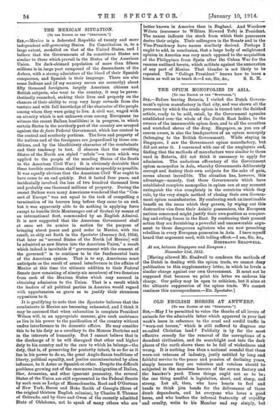THE MEXICAN SITUATION.
[To Tar Emma Or roe "Memo.")
Sia,—Mexico is a federated Republics of twenty and more independent self-governing States. Its Constitution is, to a large extent, modelled on that of the United States, and I believe that the Governments of its constituent States are similar to those which prevail in the States of the American Union. Its dark-skinned population of more than fifteen millions is in large part composed of the descendants of the Aztecs, with a strong admixture of the blood of their Spanish conquerors, and Spanish is their language. There are also some Indians and (if my memory serves me correctly) about fifty thousand foreigners, largely American citizens and British subjects, who went to the country, it may be paren- thetically remarked, staking their lives and property on the chances of their ability to reap very large rewards from the venture and with full knowledge of the character of the people among whom they were going to live. A civil war, waged with an atrocity which is not unknown even among Europeans (as witness the recent Balkan hostilities) is in progress, in which certain States in the northerly part of the country are arrayed against the de facto Federal Government, which has control in the central and southerly portion,. The lives and property of the natives and of the foreigners are jeopardized by these con- ditions, and by the bloodthirsty character of the combatants and their tendency to loot. (I observe that the revolting States of the North are styled " rebels"—a term which was applied to the people of the seceding States of the South in the American Civil War.) It is obviously desirable that these terrible conditions shell terminate as speedily as possible. It was equally obvious that the American Civil War ought to have come to an end quickly. But it lasted four years, and incidentally involved the loss of two hundred thousand lives and probably one thousand millions of property. During the recent Balkan wars many Americans wondered that the " Con. cert of Europe" was not equal to the task of compelling a termination of its horrors long before they came to an end, but it was apparently able to do nothing in applying force except to bundle little Montenegro out of Scutari by means of an international fleet, commanded by an English Admiral. It is now suggested that the American Government shall at once set its armies in motion for the purpose of bringing about peace and good order in Mexico, with the result, so ably set forth in the Spectator (January 3rd, 1914), that later on "several States of the North [of Mexico] will be admitted as new States into the American Union," a result which indeed is inevitable if " government with the consent of the governed" is to continue to be the fundamental basis of the American system. That is to say, Americans must anticipate as the result of armed interference in the affairs of Mexico at this time the ultimate addition to their Federal Senate (now consisting of ninety-six members) of two Senators from each of the Mexican States which may succeed in obtaining admission to the Union. That is a result which the leaders of all political parties in America would regard with apprehension so grave as to justify their strenuous opposition to it.
It is gratifying to note that the Spectator believes that the combatants in Mexico are becoming exhausted, and I think it may be assumed that when exhaustion is complete President Wilson will, in an appropriate manner, give such assistance as lies in his power to the pacification of the country without undue interference in its domestic affairs. He may consider this to be his duty as a corollary to the Monroe Doctrine and in the interests of humanity. But I cannot believe that in the discharge of it be will disregard that other and higher duty to his country and to the race to which be belongs—the duty, that is, of preserving for posterity intact, in so far as it lies in his power to do so, the great Anglo-Saxon traditions of liberty, political equality, and justice uncontaminated by alien influence, be it Aztec or Spanish or other. Despite the difficult problems growing out of the enormous immigration of Italian, Slav, Armenian, and other ignorant peasantry, the several States of the Union are still represented in the Federal Senate by such men as Lodge of Massachusetts, Root and O'Gorman of New York, Bacon and Hoke Smith of Georgia (three of the original thirteen English colonies), by Charles S. Thomas of Colorado, and by Gore and Owen of the recently admitted State of Oklahoma, not to speak of many ethers who are
better known in America than in England. And Woodrow Wilson (successor to William Howard Taft) is President. The names indicate the stock from which their possessors derive their origin. Their colleagues in. the Senate and in the Vice-Presidency have names similarly derived. Perhaps I ought to add, in conclusion, that a large body of enlightened opinion in America was very much opposed to the acquisition of the Philippines from Spain after the Cuban War for the reasons outlined herein, which militate against the annexation of any part of Mexico. That blunder is not likely to be repeated. The "College President" knows how to learn a
lesson as well as to teach it.—I am, Sir, 3m., S. R. H.






































 Previous page
Previous page